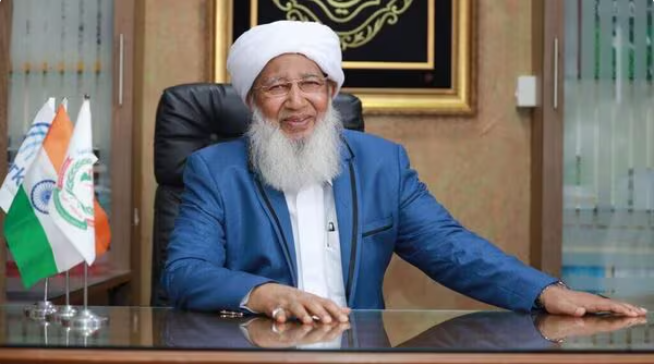– AK Kukkila
When a country of 140 crore people looked on in helpless silence as one of its citizens awaited execution in a distant and war-torn land, it wasn’t a top diplomat or a government official who stepped in. It was a quiet religious scholar from Kerala – Kanthapuram AP Aboobacker Musliyar, General Secretary of All India Sunni Jamiyyathul Ulama and Chancellor of Jamia Markaz – who took the risk, made the effort, and managed something remarkable: he opened the door to forgiveness and a possible return for a young Indian nurse, Minsha Priya.
This was not a routine legal appeal or a back-channel deal. This was something more powerful – an act of human concern, moral courage, and deep understanding of faith and culture.
Let’s not underestimate the backdrop. Yemen is not an easy country to work with. It’s not like the UAE or Saudi Arabia, where diplomatic relations are well-established and cases can be handled through formal routes. Yemen is in the middle of political chaos, with militias like the Houthis holding power, and internal strife tearing at its fabric. In such an environment, convincing a victim’s family to even come to the table takes extraordinary effort.
Yet that’s exactly what Musliyar managed. Not with power, but with patience. Not with influence, but with insight. The Grand Mufti of India, Sheikh Aboobacker Ahmad Musliyar initiated a new mediation effort through his long-time friend and Yemeni Sufi Islamic scholar Sheikh Habib Umar bin Hafiz.
Faith as a Bridge, Not a Barrier
In Islamic law, there is a principle called Diya also spelled Diyat (blood money) through which a victim’s family can choose to forgive the accused and accept compensation. It’s a principle not of barter, but of mercy. In many Arab societies, this concept is still valued deeply.
Musliyar reminded the victim’s family of this religious allowance – not as a lawyer looking for a loophole, but as a scholar appealing to their sense of faith and compassion. This approach may seem unusual in a legalistic world, but in this case, it worked. For the first time, the family agreed to begin talks. That in itself is a breakthrough.
Such efforts show us that religion, far from being a source of hatred or division – as it is often portrayed in some media – can also be a force for reconciliation and healing. It depends on who holds it, and how it is used.
A Quiet Reply to Loud Prejudices
There’s a message in all this for those who regularly label Indian Muslims as “other.” For those who mock their customs, paint their scholars as outdated, and question their loyalty. When a man like A.P. Musliyar steps into a dangerous situation and brings even a moment of hope to a fellow Indian’s life, that should speak louder than any TV debate or WhatsApp forward.
If Minsha Priya eventually returns home, many will rightly praise the Indian government. But let’s be honest – it took a Muslim scholar’s courage and knowledge to reach the point where that return became even possible.
So, what do we say now to those who call Islamic teachings backward, violent, or intolerant? Can those very teachings produce an act of kindness, negotiation, and justice like this? The answer, clearly, is yes.
A Reminder for a Plural India
This story is not just about one woman’s life. It’s about what kind of country we are – and what kind we are becoming.
India is at its best when it respects all its people. When a Hindu, a Muslim, a Christian, a Sikh can each bring their values into the public space, not to dominate each other, but to support justice, humanity, and peace.
Also Read: After a gap of 25 years, Coimbatore gets Town Kazi
Musliyar’s role is a reminder that even in dark times, people of faith, when guided by compassion, can shine a light. His act didn’t come from any official duty. It came from a sense of shared humanity. That’s something we all can learn from.
Let’s not allow noise to drown out such examples. Sometimes, the quietest actions speak the loudest.
And sometimes, a life is saved – not by power, but by someone who chooses to care.




